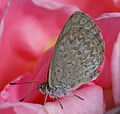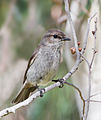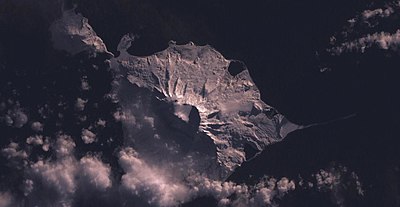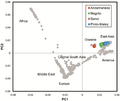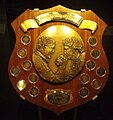Portal:Australia
| Showcase | Content | Interesting facts | Contributing |
Introduction

Australia, officially the Commonwealth of Australia, is a country comprising the mainland of the Australian continent, the island of Tasmania and numerous smaller islands. Australia has a total area of 7,688,287 km2 (2,968,464 sq mi), making it the sixth-largest country in the world and the largest country by area in Oceania. It is the world's oldest, flattest, and driest inhabited continent, with some of the least fertile soils. It is a megadiverse country, and its size gives it a wide variety of landscapes and climates including deserts in the interior and tropical rainforests along the coast.
The ancestors of Aboriginal Australians began arriving from south-east Asia 50,000 to 65,000 years ago, during the last glacial period. By the time of British settlement, Aboriginal Australians spoke 250 distinct languages and had the oldest living culture in the world. Australia's written history commenced with Dutch exploration of most of the coastline in the 17th-century. British colonisation began in 1788 with the establishment of the penal colony of New South Wales. By the mid-19th century, most of the continent had been explored by European settlers and five additional self-governing British colonies were established, each gaining responsible government by 1890. The colonies federated in 1901, forming the Commonwealth of Australia. This continued a process of increasing autonomy from the United Kingdom, highlighted by the Statute of Westminster Adoption Act 1942, and culminating in the Australia Acts of 1986.
Australia is a federal parliamentary democracy and constitutional monarchy comprising six states and ten territories. Its population of more than 28 million is highly urbanised and heavily concentrated on the eastern seaboard. Canberra is the nation's capital, while its most populous cities are Sydney and Melbourne, both with a population of more than 5 million. Australia's culture is diverse, and the country has one of the highest foreign-born populations in the world. It has a highly developed market economy and one of the highest per capita incomes globally. Its abundant natural resources and well-developed international trade relations are crucial to the country's economy. It ranks highly for quality of life, health, education, economic freedom, civil liberties and political rights.
Featured article -

Australia entered World War II on 3 September 1939, following the government's acceptance of the United Kingdom's declaration of war on Nazi Germany. Australia later entered into a state of war with other members of the Axis powers, including the Kingdom of Italy on 11 June 1940, and the Empire of Japan on 9 December 1941. By the end of the war almost one million Australians had served in the armed forces, whose military units fought primarily in the European theatre, North African campaign, and the South West Pacific theatre. In addition, Australia came under direct attack for the first time in its post-colonial history. Its casualties from enemy action during the war were 27,073 killed and 23,477 wounded. Many more suffered from tropical disease, hunger, and harsh conditions in captivity; of the 21,467 Australian prisoners taken by the Japanese, only 14,000 survived. (Full article...)
Selected biography -
Mary Teston Luis Bell (3 December 1903 – 6 February 1979) was an Australian aviator and founding leader of the Women's Air Training Corps (WATC), a volunteer organisation that provided support to the Royal Australian Air Force (RAAF) during World War II. She later helped establish the Women's Auxiliary Australian Air Force (WAAAF), the country's first and largest women's wartime service, which grew to more than 18,000 members by 1944. (Full article...)
Did you know (auto-generated) -
- ... that the Greco-Australian dialect, a variety of Modern Greek, blends words with English roots into the Greek language?
- ... that Australiformis semoni is a parasite that infests marsupials in Australia and New Guinea and whose infestation could cause debilitating ulcerative granulomatous gastritis?
- ... that to learn the rules of American football, Australian Adam Korsak, who was named the best college punter in 2022, played Madden NFL 06 and watched Any Given Sunday?
- ... that author Ann Howard interviewed more than 100 Australians about their experiences as child evacuees sent inland during World War II when a Japanese invasion seemed imminent?
- ... that South Australian Labor premier Des Corcoran was mentioned in despatches for courage and skill in evacuating casualties during the Korean War?
- ... that in 1939, a teenage Robin Ordell became the youngest radio announcer in Australia?
- ... that Scottish painter Gordon Coutts left Australia without paying maintenance to his estranged wife, but was arrested in New Zealand?
- ... that audience members interrogated suspects in an Australian Cluedo game show based on the board game?
In the news
- 30 September 2024 – Australia–Tuvalu relations, Climate change in Tuvalu
- Tuvalu's climate minister denounces the Australian Labor government's decision to expand three coal mines as an existential threat to the nation, due to the role of the mines in causing rising sea levels that have forced mass displacement across Tuvalu's low-lying islands. (The Guardian)
- 28 September 2024 – 2024 AFL premiership season
- The Brisbane Lions defeat the Sydney Swans 120–60 in the Australian Football League Grand Final to win their fourth AFL premiership title. (The Guardian Australia)
- 26 September 2024 – Israel–Hezbollah conflict
- Israel rejects proposals from the United States, Australia, and the European Union to initiate a temporary 21-day ceasefire with Hezbollah. (Reuters) (Reuters 2)
- 23 September 2024 – 2024 AFL season
- In Australian football, Patrick Cripps wins his second Brownlow Medal with 45 votes, the most votes since the current voting system was introduced, and also becomes the seventeenth player to win the award more than once. (ABC News Australia)
Selected pictures -
On this day
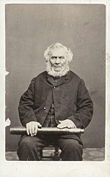
- 1800 – First copper coins circulated in New South Wales.
- 1813 – George William Evans, assistant surveyor, sets out to confirm the earlier discoveries of Blaxland, Lawson and Wentworth.
- 1834 – The first permanent European settlement on the north coast of Bass Strait is established at Portland.
- 1937 – Hubert Opperman completes an epic bicycle ride from Fremantle, Western Australia to Sydney, taking 13 days, 10 hours and 11 minutes.
- 1941 – The cruiser HMAS Sydney is involved in a mutually destructive battle with the German ship Kormoran off Western Australia. All 645 aboard Sydney die.
- 1996 – US President Bill Clinton makes a visit to Australia in which he addresses both Houses of Parliament.
- 1996 – Martin Bryant is sentenced to 35 consecutive sentences of life imprisonment plus 1035 years without parole for the Port Arthur massacre.
General images
Topics
More portals
WikiProject
 |
 |
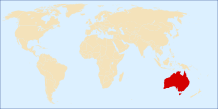
| |
Consider joining WikiProject Australia, a WikiProject dedicated to improving Wikipedia's coverage of topics related to Australia. The project page and its subpages contain suggestions on formatting and style of articles, which can be discussed at the project's notice board. To participate, simply add your name to the project members page.
As of 19 November 2024, there are 205,579 articles within the scope of WikiProject Australia, of which 594 are featured and 885 are good articles. This makes up 2.97% of the articles on Wikipedia, 5.34% of all featured articles and lists, and 2.18% of all good articles (see WP:AUSFG). Including non-article pages, such as talk pages, redirects, categories, etc., there are 526,384 pages in the project.
Associated Wikimedia
The following Wikimedia Foundation sister projects provide more on this subject:
-
Commons
Free media repository -
Wikibooks
Free textbooks and manuals -
Wikidata
Free knowledge base -
Wikinews
Free-content news -
Wikiquote
Collection of quotations -
Wikisource
Free-content library -
Wikiversity
Free learning tools -
Wikivoyage
Free travel guide -
Wiktionary
Dictionary and thesaurus





